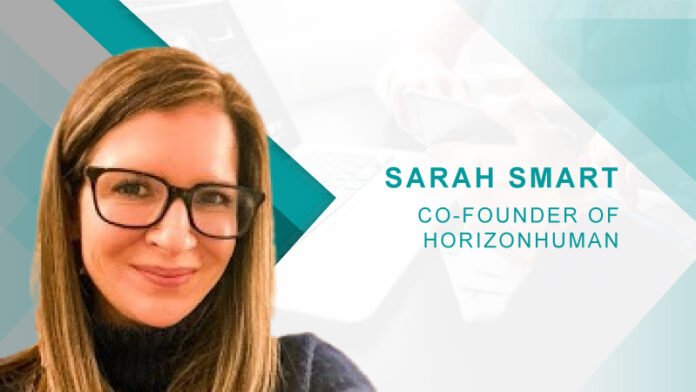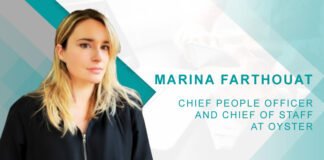To begin, could you please share your professional journey and what inspired you to co-found HorizonHuman?I began my career with the intention of becoming a lawyer, but, like so many others, I unexpectedly found myself in recruiting, and quickly fell in love with the work. Over time, my role evolved from an individual contributor to a team leader, and eventually into a functional leader. As my responsibilities grew, so did my fascination with technology as a powerful enabler for Talent Acquisition.
I co-founded Horizon Human with Sofia Whelan, a former colleague at JP Morgan, because we identified a unique niche in the marketplace. We’re not just consultants—we’re practitioners and Subject Matter Experts who have lived through countless business transformations. We’ve seen transformations succeed brilliantly, and we’ve also learned valuable lessons when things didn’t go as planned.
We both believe HR is undergoing a massive transformation. Some organizations are proactively preparing for it, others are navigating it organically, and many are simply “feeling their way” through the changes. At Horizon Human, we help HR leaders transform their functions to align with the ever-evolving needs of their businesses.
Our approach is rooted in experience. We design transformations that address resistance to change and, because we’ve been through these journeys ourselves, we understand where the pain points—or “hotspots”—are likely to arise. This allows us to help our clients plan effectively, avoid common pitfalls, and drive lasting impact.
Workforce transformation is a hot topic right now. From your perspective, how are AI and automation reshaping the way companies think about talent?This is one of our favorite topics! AI and automation hold incredible potential to transform how we work and manage talent. However, we always like to start these conversations with a word of caution. Before organizations can fully realize the value of these technologies, there’s critical groundwork to be done.
HR leaders must carefully consider how to ethically implement AI, ensure the technology is maintained and evolves responsibly, and integrate it seamlessly into workforce planning models. This requires rethinking HR strategies, assessing technology partnerships, and often revisiting existing platforms and ways of working to ensure they align with the new capabilities AI brings.
As we look ahead, we believe AI—particularly Agentic AI—will drive some exciting and transformative changes. Here are the key trends we anticipate:
From Automation to Predictive Insights: We’re moving beyond simply automating repetitive tasks to unlocking predictive capabilities that offer valuable, actionable insights. Imagine predictive workforce modeling tools that proactively alert sourcing teams to begin recruiting for business-critical roles—before the roles are formally raised. By staying ahead of talent needs, organizations can drive efficiency, reduce lead times, and better prepare for future demands.
AI as a Coach Agentic AI will enable humans to perform their jobs more effectively, acting as a personalized coach. If you’ve ever used AI to assist with writing performance reviews, you’ve already experienced some of its early benefits. Now, imagine a world where AI understands your personality profile and those of your team members.
AI could not only identify areas of performance improvement but also guide you on how to communicate feedback in a way that resonates with the recipient. This kind of tailored coaching could transform how leaders and managers interact with their teams, fostering stronger relationships, improving communication, and ultimately driving better business outcomes. We’ve seen this in action and it is a very powerful experience.
AI as a Worker and Enabler of Work Today, humans act as natural connectors within organizations, handling coordination and administrative tasks. We’re now seeing Agentic AI begin to take on some of these responsibilities—such as managing onboarding processes in talent acquisition.
But what if we went a step further? Imagine Agentic AI not just automating tasks, but helping you prioritize and execute work aligned to business goals. For example, an AI agent could review your calendar for the day and recommend which meetings to attend based on your organization’s top priorities.
As a veteran of an organization where the acronym jokingly stood for “just people meeting constantly,” I can’t overstate how transformative this feature would be. By enabling employees to focus on the work that truly matters, AI could significantly boost productivity and reduce workplace inefficiencies.
You’ve spoken about a “skills second wind.” Can you explain what that means and why it’s important in today’s work environment?
It feels like we’ve been talking about skills in HR for the last five years, yet only a small number of organizations have moved beyond the conversation and implemented skills-based models for talent development, learning, or talent acquisition. However, we believe we’re entering the “second wind” of the skills journey.
As more companies recognize the complexity involved in setting up a truly skills-based organization—and begin to understand the availability of third-party tools to enable this transition—we’re going to see a shift from skills strategy to skills implementation.
So, what does this look like in practice?
- Automating Question Banks for Skills Assessment: By linking skills to specific positions, organizations can automate question banks, creating a faster and more efficient funnel for candidate review.
- Streamlining Succession Planning: Skills-based approaches allow for the automation of early-stage succession planning, shifting the nine-box review process from subjective, conversation-based discussions to data-driven decision-making sessions.
- Transforming Talent Pipelines: Skills-based strategies help organizations identify, assess, and develop talent more effectively, ensuring a stronger alignment between workforce capabilities and business needs.
These are just a few of the ways we’re already seeing skills-based approaches transform the workplace. By moving beyond talk and embracing implementation, organizations can unlock the full potential of a skills-based workforce, creating efficiencies and driving better outcomes across HR functions.
What are some of the key challenges organizations face when shifting to a skills-based talent strategy?
Operationalization, operationalization… oh, and expertise. Skills-based talent management isn’t just a buzzword; it’s a fundamentally new way of working. It’s not as simple as developing a competency framework and aligning it to a position code (we’ve seen this before—and spoiler alert: it doesn’t work).
The real power of skills lies in leveraging the right tools to unlock actionable insights. Platforms like TechWolf and Reejig are great examples of technologies that can help map your organization’s talent against external markets, providing a data-driven approach to benchmarking. These tools enable organizations to identify which skills are most critical for the roles that drive their businesses and compare their internal talent landscape against external talent pools.
This shift isn’t just about understanding internal talent in isolation. It’s about taking a holistic view of the talent marketplace and assessing how your existing workforce performs relative to competitors. By embracing this approach, organizations can unlock valuable
business insights, such as:
- Why is my company underperforming compared to peers?
- Why is my attrition rate so high—or so low?
This data-driven approach to skills helps organizations move beyond static frameworks and into a dynamic, competitive mindset. Skills operationalization isn’t just a project—it’s a transformation that enables businesses to thrive in an ever-changing marketplace.
How can leaders move beyond buzzwords and practically implement skills-based approaches across their organizations?Make a business case for the investment in skills. Start small and build on the foundation. Successful business cases could involve:
- reducing time spent in succession planning
- partially or fully automating compensation planning
- reducing the time to hire for skills-aligned roles
- implementing the most effective assessment tools against critical skills frameworks, increasing your quality of hire.
You need the business case because you’re going to invest in technology to help you map skills. Believe it or not, most organisations have all the data that they need to develop a skills framework;, you’re just missing benchmarking data and a framework. You don’t need an army of business partners or data analytics professionals to do this work, you need one or two subject matter experts to help you take the data and apply it to your business case.
Pilot first, drive change in a small but measurable way. Measure against your business case often. Use the success of your business case to drive more investment into the transformation.
How can companies ensure equity and inclusion when applying skills-based hiring and development practices?
To succeed with a skills-based approach, you need a deliberate framework and strategy. Start by setting clear objectives and establish a process for measuring outcomes consistently.
This work requires leveraging the skills and capabilities within your organization to:
- Design KPIs that align with your strategic goals.
- Set up data streams and dashboards to monitor progress and performance.
- Analyze reporting to accurately identify trends and gaps.
But the real value comes from actioning your insights. Don’t stop at simply admiring the data—use it to drive meaningful change. Here are a few ways to turn data into action:
On a personal note, what’s your go-to strategy when advising companies on major talent transformation initiatives?
When we begin an engagement, we come in as experts in our fields—but we don’t presume to be experts on your organization or industry. That’s why we prioritize listening. We take the time to understand your unique context, challenges, and goals.
Often, companies engage us because they have invested in a new technology and need help with its implementation. What we frequently discover during our structured intake sessions is that our clients also need support in defining—or redefining—their expected outcomes and objectives.
We approach every engagement through the lens of design thinking:
- What is the end result we’re trying to achieve?
- What does success look like for your organization?
Nine times out of ten, we find that while our clients began their journey with a clear objective, they’ve drifted farther from it as the implementation progressed. This is where we step in.
- We listen to uncover the root of the challenge.
- We provide guardrails and guidance to realign your efforts with your objectives.
- And when needed, we parachute in to lead, offering hands-on support to drive results.
Whether you need a partner to guide the process or someone to take charge and deliver outcomes, we adapt to meet your needs. At the heart of everything we do is a commitment to helping you achieve the results that matter most.
What advice would you give to HR and business leaders looking to future-proof their workforce in a rapidly changing landscape?
Take a step back and evaluate your HR organizational structure and the skill sets within your team. Ask yourself:
- Do your HR leaders possess the technical expertise needed to navigate today’s challenges?
- Are they equipped to manage the complexities of a hybrid workforce that blends AI and human employees?
- Are your HR investments balanced between sustaining existing systems and adopting new technologies?
- Is your team able to operate with agility to drive results, or are you still stuck in a traditional waterfall model?
We’ve entered a new age of HR, where technology is reshaping how we work, hire, and support employees. If your HR team isn’t structured or skilled to fully leverage the opportunities that modern HR technology provides, your organization will struggle to keep up.
HR teams that fail to adapt risk falling short in delivering valuable, strategic support to their business partners. To thrive in this new era, HR must evolve to become not only a driver of operational excellence but also a strategic enabler of business success.
Finally, any closing thoughts on where you see workforce transformation heading over the next few years—and how organizations can stay ahead of the curve?
The past five years have been a wild ride in workforce transformation. From the disruptive impact of the pandemic to the widespread adoption of SaaS in HR, we’ve seen a revolution in how organizations manage their people. SaaS tools have given HR practitioners access to better data, offering deeper insights into what’s really happening within their organizations.
Now, we’re on the cusp of the next major shift: widespread skills adoption, driven not by people, but by AI-powered tools.
To take full advantage of this next wave, it’s time to get curious:
- Ask questions—even the “dumb” ones. Push beyond surface-level understanding to truly grasp how these tools work.
- Attend conferences and explore the expo floors. Engage with vendors and challenge them to explain how their solutions deliver real value.
- Don’t believe the hype. Go beyond marketing buzzwords and evaluate tools critically. Make sure you’re measuring your tools performance often against standard KPIs.
- Collaborate with your peers. Share lessons, exchange ideas, and learn from what’s worked (and what hasn’t) in other organizations.
- Empower your HR teams. Make AI and technology literacy a priority across your organization. Equip your teams with the knowledge they need to confidently navigate this new era.
The future of workforce transformation is here. By staying curious, engaged, and informed, you’ll position your HR organization to lead, innovate, and thrive in the age of AI and skills adoption.

Sarah Smart ,co-founder of HorizonHuman
Sarah Smart is a recognized leader in talent acquisition, HR technology, and workforce transformation, with over 20 years of experience driving innovation at global organizations, including Hilton Worldwide, Accenture, and JPMorgan Chase. She is the Co-Founder of HorizonHuman, where she designs and leads HR transformation initiatives, leveraging her expertise in evaluating Artificial Intelligence and Automation solutions to optimize talent strategies and organizational effectiveness.
Throughout her career, Sarah has spearheaded AI-driven recruitment strategies, advanced HCMS implementations, and process innovations that align organizations with the evolving landscape of HR. Most recently, she led the Product Organization for Talent Acquisition at JPMorgan Chase, overseeing strategic recruitment initiatives and implementing AI-powered hiring solutions. She also led the Chase Recruiting Organization, driving operational excellence in talent acquisition for one of the world’s largest financial institutions.
Before JPMorgan Chase, Sarah led the Global Recruiting Function at Hilton, shepherding the organization through the adoption of emerging technology and supporting the expediential growth during the golden age of hospitality. Prior to Hilton, served as Associate Director of Global Leadership Recruitment at Accenture, where she led a team of 40+ executive recruiters, defining recruitment strategies and optimizing executive-level talent acquisition on a global scale.
Sarah holds a master’s degree in Organizational Behavior Studies from Columbia University and is an active board member of St. John's College. A member of the Human Centric AI Council, shaping what human-centric AI looks like in HR, she is a frequent speaker at industry events and is recognized for her expertise in AI-driven talent acquisition, workforce transformation, and HR innovation.
Company profile:
HorizonHuman is a transformative HR consulting group based in Washington, D.C., with over 25 years of combined expertise in guiding organizations through the ever-evolving workplace landscape. Specializing in HR transformation, HorizonHuman helps businesses design strategic HR frameworks, build future-proof HR Tech Stacks, equip HR teams for success, and coach leaders through change. By leveraging cutting-edge technologies and forward-thinking solutions, HorizonHuman enables organizations to create a resilient, high-performing workforce. HorizonHuman’s mission is to empower HR leaders and HR Tech innovators to navigate change with confidence, turning challenges into opportunities for long-term success. Consulting to CHROs across industries worldwide, HorizonHuman is a trusted partner in shaping the future of work through sustainable, people-centric solutions.












